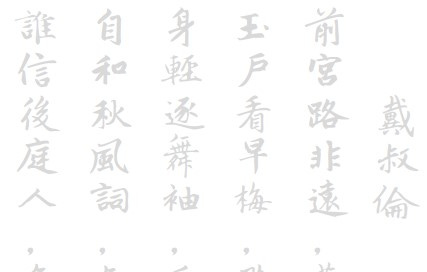Out of Sight
Dai Shulun
.
The hall where I once lived is just nearby,
Come see the gardens! Spring is at its height.
Those high jade gates looked out on winter plum,
On carved roof beams the swallows broke their flight.
I danced; my floating form chased whirling sleeves,
I sang; my coy fan stoked the incense bright.
My songs took on a sombre autumn tone.
As I waited in the women's hall, Sunlight.
Who would believe I was a concubine?
So many years I languished out of sight.
Out of Sight was a title used by many poets, all writing on the theme of a woman missing her husband who has been away for many years. This may be because he loves another, or is away at war, or has gone to work for the emperor. Only one poem with this title was judged good enough to be included in the 300 Tang Poems, but the Complete Tang Poems includes nine with this title, and they form a fascinating series, dating back to the 6th century, before the beginning of the Tang.
Often, the title of a poem gave name of the tune to which it should be sung. However, that doesn't seem to be the case for Out of Sight: some of the poems are very short, while others are medium length; some use short lines, others long. Instead, the poems are linked by two themes: the loneliness of a woman whose husband is away, and rich lifestyles. Both themes are brought out most clearly by Shen Quanqi in the single Out of Sight poem collected in the 300 Tang Poems.
Dai Shulun lived from 732-789. His mid-Tang style is much more mature than the allusive versions that came before, creating a vivid character in just a few spare lines.
This poem seems to be a variation on the same story as the first Out of Sight poem by Liu Yun.
戴叔伦 独不见
前宫路非远,旧苑春将遍。
玉户看早梅,雕梁数归燕。
身轻逐舞袖,香暖传歌扇。
自和秋风词,长侍昭阳殿。
谁信后庭人,年年独不见。



